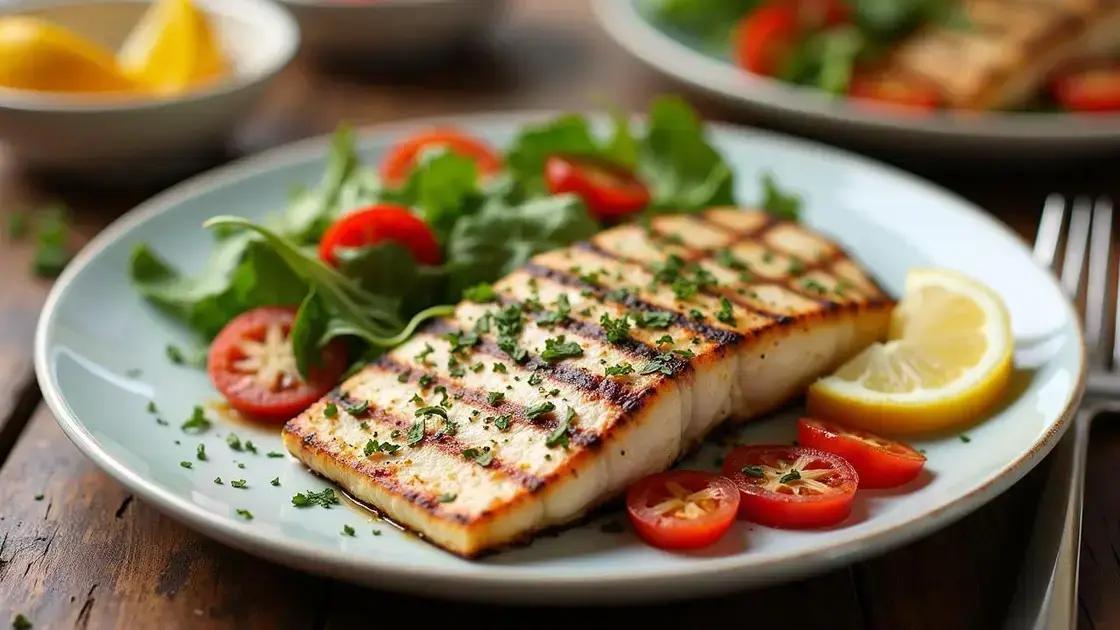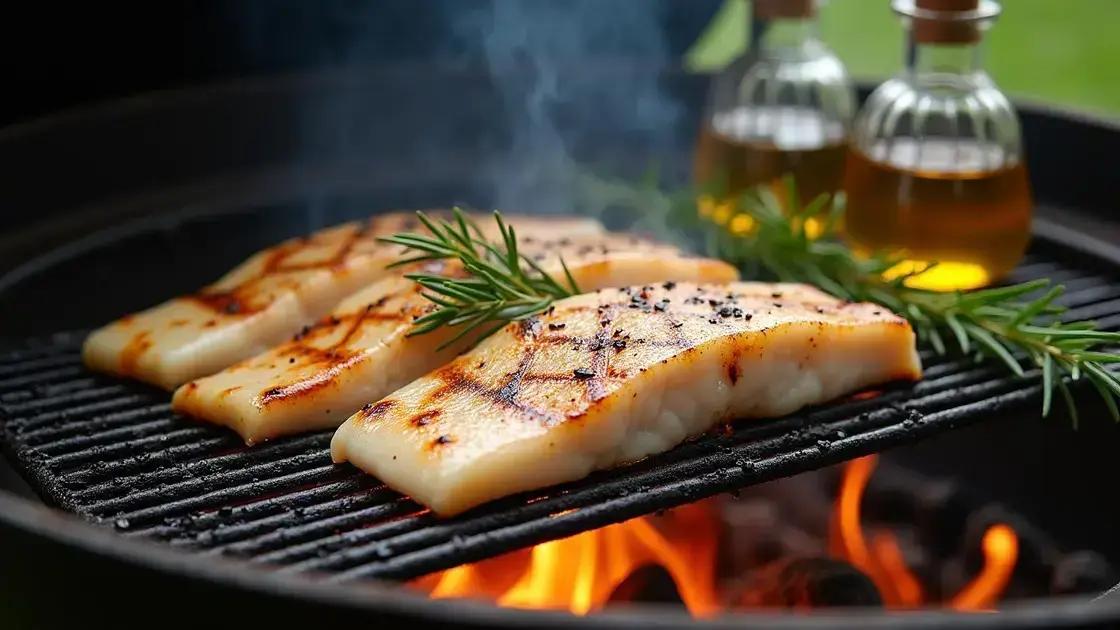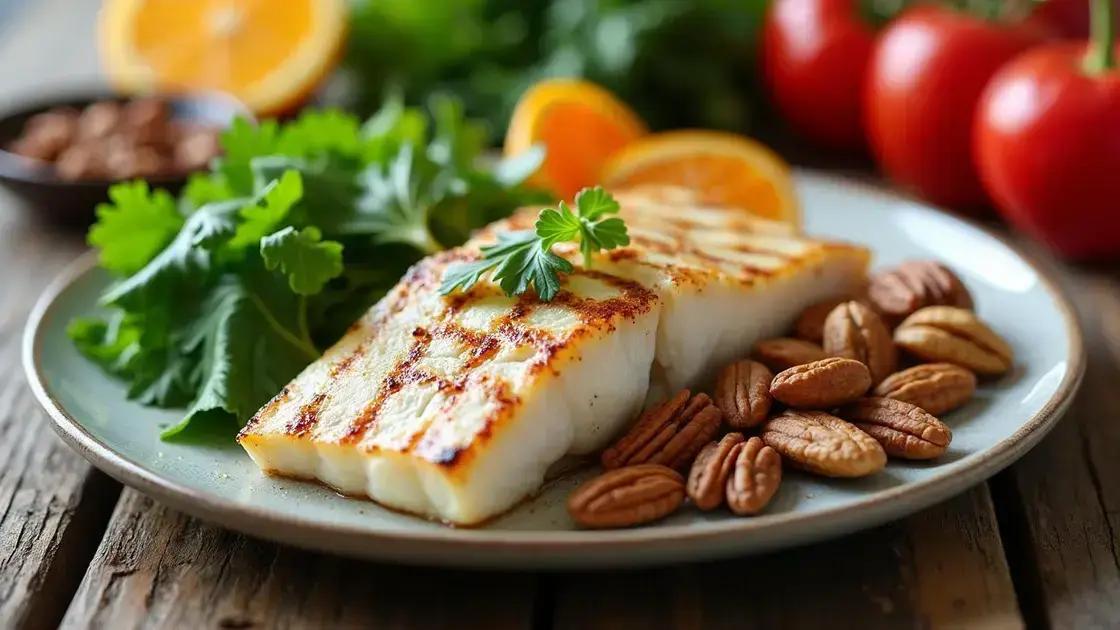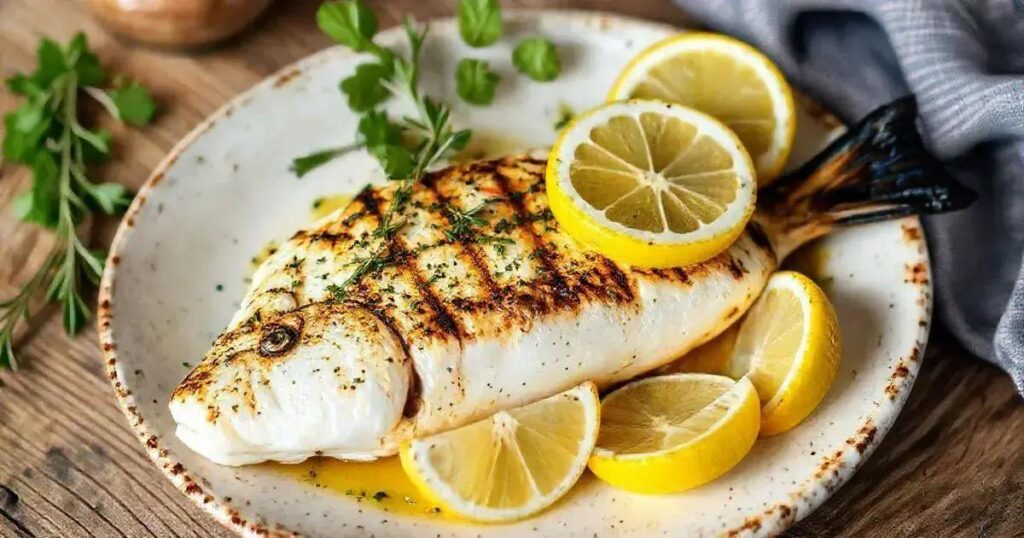Grilled halibut and lemon recipes are ideal for incorporating healthy fats and supporting hormonal balance. Enjoy delicious meals by following grilling techniques, using nutritious lemon recipes, and understanding the connection between hormones and nutrition for optimal health.
Grilled halibut and lemon recipes are a tasty and nutritious way to include healthy fats in your diet. Packed with omega-3 fatty acids, grilled halibut not only supports heart health but also helps maintain hormonal balance. In this post, we will dive into the health benefits of halibut, delicious lemon-infused recipes you can try, grilling techniques for perfectly cooked fish, and the connection between nutrition and hormones.
Health Benefits of Halibut and Healthy Fats

Halibut is a versatile and delicious fish that provides numerous health benefits. It is rich in omega-3 fatty acids, which are essential for heart health. These healthy fats can help reduce inflammation, lower cholesterol levels, and improve blood circulation.
Great Source of Protein
In addition to healthy fats, halibut is also an excellent source of high-quality protein. This is crucial for building and repairing body tissues, supporting muscle growth, and maintaining a healthy immune system.
Rich in Nutrients
Halibut is packed with essential vitamins and minerals. It contains Vitamin B12, which is vital for energy production and brain health. Additionally, halibut is a good source of selenium, an antioxidant that helps protect your cells from damage.
Supports Hormonal Balance
The omega-3 fatty acids found in halibut can play a significant role in hormonal balance. They help to regulate hormones and may reduce symptoms associated with hormone imbalances, such as mood swings and fatigue.
Adding halibut to your diet can easily contribute to a more balanced and nutritious meal plan. When paired with lemon and grilled to perfection, you not only enjoy a delicious dish but also boost your intake of healthy fats that nourish your body.
Delicious Lemon Recipes to Try

Lemon is a fantastic ingredient that adds flavor and brightness to a variety of dishes. Here are some delicious lemon recipes that pair wonderfully with grilled halibut and provide healthy fats to your meal.
Lemon Garlic Butter Sauce
This simple sauce enhances the flavor of grilled halibut beautifully. Combine melted butter with minced garlic, fresh lemon juice, and chopped parsley. Drizzle it over the halibut before serving to give it a zesty kick.
Grilled Lemon Herb Marinade
Create a marinade using fresh lemon juice, olive oil, minced garlic, and your favorite herbs like rosemary and thyme. Marinate the halibut for at least 30 minutes before grilling. This not only infuses flavor but also helps keep the fish moist.
Lemon Quinoa Salad
A light lemon quinoa salad makes a perfect side dish for halibut. Prepare quinoa and mix with diced cucumbers, tomatoes, and a lemon vinaigrette made from lemon juice, olive oil, salt, and pepper. It’s refreshing and packed with nutrients.
Roasted Lemon Asparagus
For a vibrant vegetable side, roast asparagus with olive oil and lemon slices. Simply toss asparagus in olive oil, place lemon slices on top, and roast until tender. This dish adds a delicious pop of flavor that complements the halibut.
These delicious lemon recipes not only elevate your grilled halibut but also provide a burst of healthy fats and vibrant flavors to your meal.
Grilling Techniques for Perfect Halibut

Grilling halibut can be a delightful experience when done correctly. Here are some effective grilling techniques to ensure your halibut turns out perfect every time.
Choose the Right Cut
When grilling halibut, always opt for thick cuts. Thick fillets hold their shape better on the grill and remain moist. Avoid thin pieces that can easily fall apart during cooking.
Preheat the Grill
Preheat your grill to medium-high heat. This helps to sear the fish and creates nice grill marks. A properly heated grill also prevents the fish from sticking.
Use a Grill Basket or Foil
To prevent halibut from falling through the grill grates, consider using a grill basket or wrapping it in aluminum foil. This makes handling easier and keeps the fish intact while cooking.
Oil the Fish and Grill
Before grilling, brush both the halibut and the grill grates with oil. This helps to create a non-stick surface and enhances the grilled flavor. Use a high smoke point oil, like avocado or canola oil.
Cook with the Skin Side Down
If your halibut has skin, place it skin-side down on the grill. This allows the skin to become crispy while protecting the delicate flesh from direct heat.
Monitor Cooking Time
Grill halibut for about 4-6 minutes per side, depending on thickness. The fish is done when it easily flakes with a fork and has an internal temperature of 145°F.
By applying these grilling techniques, you can create a flavorful and perfectly cooked halibut that features beautifully in your healthy meals.
Hormones and Nutrition: The Connection

Nutrition plays a crucial role in regulating hormones in the body. Eating the right foods can help maintain hormonal balance and overall health. Here are some key points on the connection between hormones and nutrition.
Impact of Macronutrients
Calories and macronutrients—carbohydrates, proteins, and fats—are essential for hormonal health. Consuming a balanced diet helps to support hormone production and digestion. For example, healthy fats, like those found in halibut, are vital for hormone synthesis.
Role of Vitamins and Minerals
Vitamins and minerals such as Vitamin D, magnesium, and zinc play important roles in hormone regulation. Foods rich in these nutrients support the glands that produce hormones. Including leafy greens, nuts, and fish like halibut in your diet enhances your nutritional intake.
Blood Sugar Stability
Maintaining stable blood sugar levels is key to hormone balance. Fluctuations in blood sugar can lead to hormone imbalances, causing issues like cravings and mood swings. Incorporate whole grains and proteins in meals to keep blood sugar steady.
Anti-inflammatory Foods
Inflammation can disrupt hormone functions. Consuming anti-inflammatory foods, such as fatty fish, fruits, and vegetables, can help reduce inflammation and promote better hormonal balance. Omega-3 fatty acids from halibut are especially beneficial.
Understanding the connection between hormones and nutrition empowers you to make mindful food choices. By incorporating healthy fats and nutrient-dense foods, you can support your body’s hormonal health.
Final Thoughts on Grilled Halibut and Nutrition
Incorporating grilled halibut and lemon recipes into your diet offers numerous health benefits, including enhanced hormone balance and healthy fat intake. The techniques for grilling halibut can enhance your cooking skills, while delicious lemon recipes complement this fish perfectly.
Understanding the connection between hormones and nutrition empowers you to make better food choices. Focus on nutrient-dense and anti-inflammatory foods to support your health.
By embracing these flavorful and nutritious options, you can enjoy tasty meals that fuel your body and promote well-being.
FAQ – Frequently Asked Questions About Grilled Halibut and Nutrition
What are the health benefits of eating halibut?
Halibut is rich in omega-3 fatty acids, which promote heart health, reduce inflammation, and support hormonal balance.
How should I grill halibut to avoid it falling apart?
Use thick cuts of halibut and consider cooking with skin side down. You can also use a grill basket or foil to prevent sticking.
What are some good recipes to pair with halibut?
Try lemon garlic butter sauce, grilled lemon herb marinade, or roasted lemon asparagus for delicious complementing flavors.
How does nutrition affect hormones?
Nutrition plays a key role in hormone regulation. Eating a balanced diet with healthy fats, proteins, and essential vitamins supports hormonal health.
Can I use frozen halibut for grilling?
Yes, frozen halibut can be grilled, but it’s best to thaw it completely in the refrigerator before cooking for better texture and flavor.
What types of fats are best for hormonal health?
Healthy fats, such as those found in fatty fish, nuts, and avocados, are essential for hormone production and regulation.












